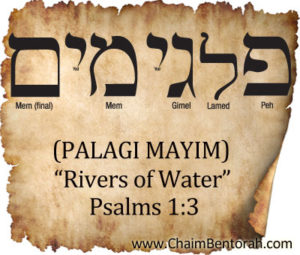HEBREW WORD STUDY – RIVERS OF WATERS – PALAGI MAYIM
Psalms 1:3: “And he shall be like a tree planted by the rivers of water, that bringeth forth his fruit in his season; his leaf also shall not wither; and whatsoever he doeth shall prosper.”
 As a teenage in our church youth group we used to sing a chorus “Just like a tree planted by the waters, I shall not be moved.” For sentimental reasons I could not let go of that idea of not being moved in relationship to Psalms 1:3 but let’s face it, the verse is not talking about being immovable but of bearing fruit and life. In context from verse 2 when we meditate on the instructions of God day and night we will bear fruit like a tree planted by rivers of water.
As a teenage in our church youth group we used to sing a chorus “Just like a tree planted by the waters, I shall not be moved.” For sentimental reasons I could not let go of that idea of not being moved in relationship to Psalms 1:3 but let’s face it, the verse is not talking about being immovable but of bearing fruit and life. In context from verse 2 when we meditate on the instructions of God day and night we will bear fruit like a tree planted by rivers of water.
I found something interesting in the Talmud this morning in Avodah Zarah 19a that there are two words in Hebrew for planting, nata’ and shatal. The Talmud teaches that there are no synonyms in Hebrew, thus they see a distinction between the planting of nata’a and shatal. Nata’ is just planting a seed, but shatal, which is used in this study verse, is a transplanting of young shoots into the best possible soil suited for growth. The sages further teach that shadal is phonetically related to shatal and is a word play on shatal, transplanting. Shadal is an expression of earnest endeavor. We recognize this as a word play because of the context which is speaking a meditating on the Word of God.
When we meditate on the Word of God in an earnest endeavor we will be moved from the infertile ground we are on now where we are producing no fruit or no new life (for us Christians that would mean no evangelization) and we will be transplanted to the best possible soil suited for growth.
Oddly the word for river is palag which means a brook, stream or river is in a plural form. Ancient rabbis have pointed out that palag also means to divide or go apart. Palagi myim rivers of waters (plural) would denote separate branches of water, all springing from the same source. This could be interpreted many ways. I like to think that God plants His people in many different churches to grow. Some in the Baptist, some in full Gospel, some in Church of Christ, Methodist, Lutheran, Catholic who all form many streams of knowledge but all from one source in Jesus Christ. The Talmud further teaches in Avodah Zarah 19a that to avoid becoming one sided, we must seek our knowledge of God from more than one teacher – palagi myim.







Recent Comments